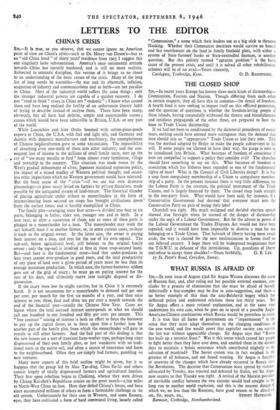• LETTERS TO THE EDITOR
CHINA'S CRISIS
SIR—It is true, as you observe, thit we cannot ignore an American point of view on China's crisis—such as Dr. Henry van Dusen's—but as an "old China hand" of thirty years* residence from 1903 I suggest this one singularly lacks substantiation. America's once sentimental attitude towards China has recently hardened, and is still no more realistic. Subjected to semantic discipline, this version of it brings us no closer to an understanding of the basic causes of the crisis. Many of the long list of long words he assembles—the war and its aftermath, inflation, stagnation of industry and communications and so forth—are not peculiar to China. Most of the industrial world suffers the same things ; only the stronger industrial powers are capable of a quicker recovery. I do not "tend to think" crises in China are " endemic " ; I know what caused them and have long realised the futility of an unfortunate literary habit of trying to describe instead of analyse them. There have been many, obviously, but all have had definite, simple and ascertainable causes ; causes which would have been admissible in Britain, U.S.A. or any part of the world.
While Lancashire and later Osaka boomed with cotton-piece-goods exports to China, the U.S.A. with fuel and light oils, and Germany and Austria with domestic manufactures and machinery, the unemployment of Chinese haradicraftsmen grew to some 12o,000,000. The impossibility of absorbing even one-tenth of them into other industry, and the con- sequent loss of income to the millions of small family units sent up the cry of "too many mouths to feed" from almost every farmhouse, village and township in the country. This situation was made worse by the , West's gradual debasement of silver, Japanese mainland expansion policy, the impact of a mixed medley of Western political thought, and count- less other impositions which no Western government would have tolerated. But the basic cause of the "crisis "—if we use our own dramatic phraseology—is gross usury levied on farmers by private financiers, made possible by the antiquated system of land-tenure. The historical blunder of placing agriculture under tribute to moneylenders in the form of interest-bearing loans secured on crops has brought civilisations down"' from the earliest times, and is harshly exemplified in China.
The family plot—averaging some four acres—is divided into four to six parts, belonging to father, elder son, younger son and so forth. In a lean year, or after a succession of them, one or more of these parts is pledged to a moneylender for a loan. The moneylender may work the soil himself, lease it to another fanner, or, in some curious cases, re-lease it back to the original owner. In the latter case' the owner is paying both interest on a loan, and rent for the use of his own topsoil. The sub-soil, below agricultural level, still belongs to the original family owner ; only the top-soil is involved at first in these crop-secured loans. But—and here is the fundamental error—land that under-produces in lean years cannot over-produce in good years, and the total productivity of any piece of land over a given period of years must be less than its average maximum production. In which case, the farmer-borrower seldom gets out of the grip of usury, ; he must t go on paying interest for the rest of his days, and ultimately starie into outright disposal or dis- possession.
If the usury were low he might survive but in China it is extremely harsh. It is not uncommon for a moneylender to demand and get one per cent. per month for the first six months of a year, and then raise interest to two, three, four and often ten per cent a month towards the end of the financial year—usually the Chinese New Year. Cases are legion where the total accrued interest corresponds to what we should call one hundred to one hundred and fifty per cent, per annum. This ." free contract" raising of interest is both an effort to force the borrower to pay up the capital faster, or to force upon him a further loan for another part of the family plot, from which the moneylender will gain in rentals to still other farmers. And thebitd part of this dealing is that the new lessees are a sort of transient farm-worker type; perhaps long since dispossessed of their own family plots, or just wanderers with no tradi- tional roots in the native soil, and often a source of annoyance and harm to the neighbourhood. Often they are simply bad farmers, gambling na new ventures.
Many more aspects of this brief outline might be given, but it so happens that the group led by Mao Tze-ding, Chou En-lai and others consist largely of totally dispossessed farmers and agricultural families. Their first open rebellion began in Chekiang, whence they were driven by Chiang Kai-shek's Republican armies on the great march-4,7o° miles to North-West China on foot. Here therdified Chiang's forces, and have since accumulated millions of others to form a formidable challenge to The old system. Unfortunately for their case in Western, and some Eastern, eyes, they have cultivated a form of hard cominunal living, loosely called "Communism," a name which their leaders use as a big stick to threaten Nanking. Whether their Communist doctrines would survive an honest and fair resettlement on the land in family freehold plots, with either 3 system of State farmers' banks or State-controlled finances, is another question. But this politely termed "agrarian problem" is the basic cause of the present crisis, and until it is solved all other rehabilitation schemes will be of no-avail.—Yours sincerely,


























 Previous page
Previous page